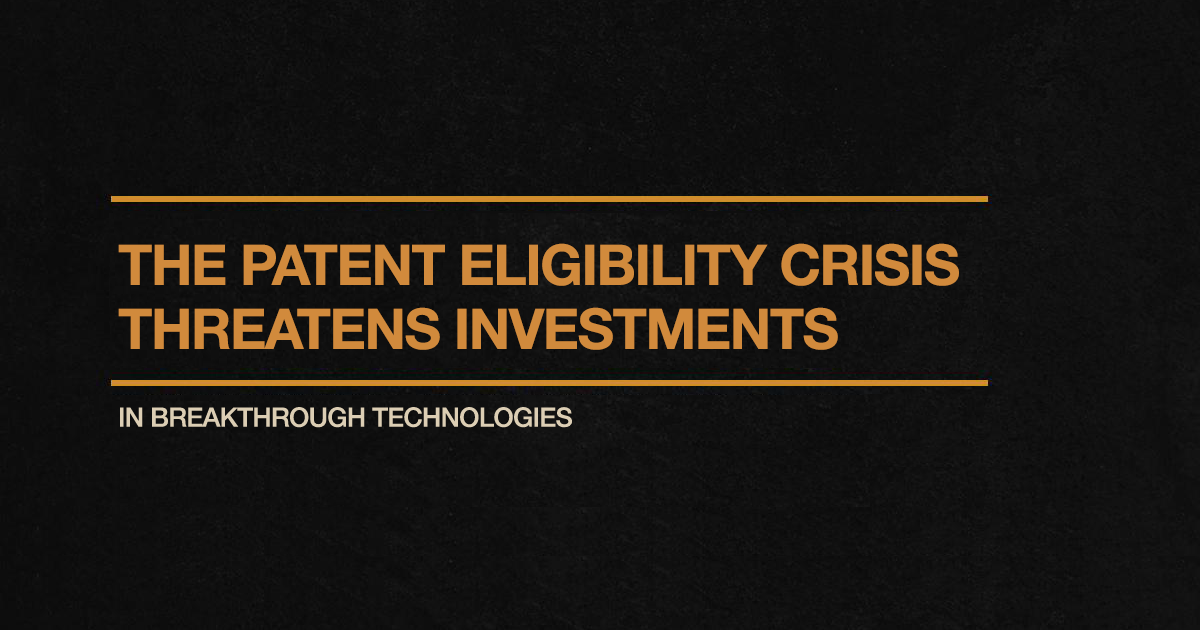The Patent Eligibility Crisis Threatens Investments in Breakthrough Technologies

One of the most pressing issues hindering innovation in the United States is the uncertainty surrounding patent eligibility jurisprudence. Since 2005, the Supreme Court has issued four unprecedented rulings related to Section 101, the section of the Patent Act addressing determinations of what is and what is not eligible to be patented. In these rulings, the high court collectively demonstrated its willingness to substitute its own judgment for the statutory language adopted by Congress and thereby significantly expand the types of inventions that no longer are deemed “patent eligible.” These rulings ignore the actual language of the statute, replacing it with a “judicial exception” that allows the Court to impose its own views as to what is eligible for protection. Section 101 is simple and clear:
“Whoever invents or discovers any new and useful process, machine, manufacture, or composition of matter, or any new and useful improvement thereof, may obtain a patent therefor, subject to the conditions and requirements of this title.”
The Supreme Court has long held that products of nature, laws of nature and abstract algorithms, formulas and equations are not eligible for patent protection. No one can quarrel seriously with that list, because none of those phenomena fall into one of the four statutory categories. It is more convenient, however, for the Court to refer to the non-statutory nature of the list as “judicially created exceptions” to the law as written by Congress, because this characterization provides greater license for the Supreme Court to rewrite the law unconstrained by the patent statute.
Taken as a whole, the Court’s rulings and their implementation by the lower courts have made it vastly easier for infringers to invalidate patents or – barring that – simply to ignore the patents without consequence. This, in turn, has diminished the level of entrepreneurship and investor appetite for starting new companies and pursing new technologies in industries that are dominated by large, well-funded incumbents, such as those that dominate digital technologies.
Fortunately, several key senators are paying attention to this issue and working to advance a legislative fix. Earlier this year, Senate Judiciary IP Subcommittee Ranking Member Tillis (R-NC) and several of the IP subpanel members – Hirono, (D-HI), Cotton (R-AR), and Coons (D-DE) – asked the USPTO to collect comments on the state of patent eligibility jurisprudence in the United States and prepare a detailed summary of its findings. According to the letter, the study will help the senators consider “what legislative action should be taken to reform our eligibility laws.”
The Alliance for U.S. Startups and Inventors for Jobs (USIJ) – an association of inventors, startups, venture capital investors, entrepreneurs, and supporters – submitted comments to USPTO detailing how the uncertainty surrounding patent eligibility is hindering investment in critical breakthrough technologies. The comments note that several investors who form part of the USIJ community report having decided not to invest in certain areas of technology, such as diagnostic procedures, as a result of the manner in which the Mayo decision, one of the four key Supreme Court decisions related to Section 101, is being applied by the Federal Circuit.
USIJ members are hopeful that this study will demonstrate the dire need for legislative reform to Section 101, a crucial step in renewing this country’s commitment to the startups, entrepreneurs, and inventors who have played such an important role in ensuring U.S. dominance of critical technologies. By providing clarity on this matter in statute, Congress can help ensure that America’s unique ability to translate scientific learning into new products and services is fully harnessed.
Chris Israel is Executive Director of the Alliance for U.S. Startups and Inventors for Jobs (USIJ) and a Senior Partner at ACG. He previously served as Deputy Chief of Staff to the Secretary of Commerce and as the first U.S. International Intellectual Property Enforcement Coordinator.
